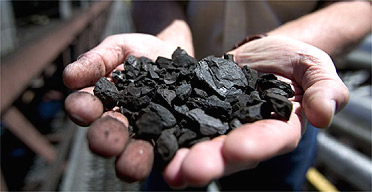
The following correction was printed in the Guardian's Corrections and clarifications column, Thursday May 24 2007
The article below described technology that would "separate carbon from the fossil fuel combustion products". We meant to indicate that carbon dioxide and other emissions would be removed. Carbon is the principal combustible component of fossil fuel.
Two of the biggest names in the energy field, BP and Rio Tinto, are to establish a joint venture for schemes that would allow utilities to generate almost carbon-free electricity using "clean coal" technology.
The move comes a week before the government's energy white paper will underline its support for trials using carbon capture and storage to help coal - and less carbon-intensive fuels such as gas - to play a significant role in a future British energy mix.
BP has spent the past two years planning the world's first industrial-scale project to produce CO2-free power at a plant in Peterhead, Aberdeenshire, with the greenhouse gases being piped off to the North Sea, where they would be used to increase oil recovery.
The tie-up with Rio will enable the British oil company to offer similar coal-fired projects worldwide at a time when hundreds of new coal plants are being built to meet soaring world energy demand.
BP, which has also recently outlined plans for a second experimental plant at Carson in California, wants to develop itself as a leader in the field of carbon sequestration, a technology that has been given tentative support by environmental groups such as Friends of the Earth.
Rio Tinto is one of the world's biggest coal miners with collieries in New South Wales and Queensland in Australia that serve markets in China and the rest of the far east and others in Wyoming, Montana and Colorado in the US. The company is already engaged in initiatives to explore the potential for burning coal without producing high levels of greenhouse gases.
Neither Rio nor BP were last night willing to discuss the initiative, which they are due to unveil today. "We have got this joint venture but we do not want to talk about it now," said a Rio spokesman.
Friends of the Earth said it supported any trials into carbon abatement "given climate change is so urgent" but it argued that lifestyle change, energy efficiency and renewables should be given priority.
The Peterhead power station planned by BP in co-operation with Scottish & Southern Power would produce 475 megawatts and cost over £500m. The facility would extract hydrogen and carbon dioxide from natural gas and use the hydrogen for the power station. The CO2 would be transported through existing pipelines to the Miller oil field in the North Sea, where it would be injected into a reservoir four kilometres below the sea bed to help extract an extra 60m barrels of oil before being stored.
But BP has always made it clear that this experimental project and others will not proceed unless the government provides an incentive, perhaps by allowing it to win renewable obligation certificates.
Further details about government thinking on carbon capture and storage will be revealed next Wednesday when the energy white paper is published. The chancellor, Gordon Brown, has already allotted £35m for the demonstration of different carbon-abatement technologies and called for a competition under which companies should submit bids for their trial projects to be included.
BP plans to offer its Peterhead scheme and the entrepreneur Richard Budge has unveiled plans to re-open the Hatfield colliery in Yorkshire to provide fuel for a 1,000MW clean-coal power station with a carbon-capture mechanism. Similar plans are being looked at by Centrica for Teesside and by SSE at Ferrybridge while the G8 and European Union are encouraging the deployment of carbon sequestration schemes in China and India.
A report issued this week on clean coal by the Centre for Policy Studies gave strong support to the concept and urged the government to take action. "Barriers to clean-coal technology being embraced and pursued are not technical. The technology exists and has existed for some time," says the report's author, Tony Lodge. "If the government wishes to genuinely embrace a competitive, market-orientated energy policy which reduces C02 and maintains crucial baseload energy provision, then it must support clean coal alongside new nuclear stations."
What is clean coal?
At the very least the expression "clean coal technology" describes the fitting of filters to screen out much of the sulphur from old coal-fired power stations. Others use it to describe "supercritical" power plants that burn coal much more efficiently with lower emissions.
The latest form of clean coal technology would separate the carbon from the fossil fuel combustion products and then store it in a spent North Sea oil field. Green groups are cautiously supportive.

